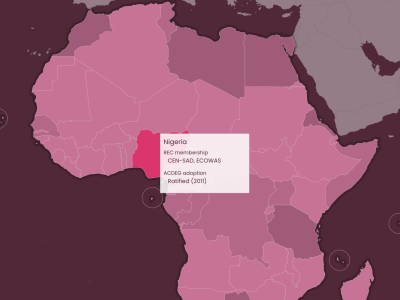
Interactive tool: Data policies in African countries
Through this interactive tool, Melody Musoni and Nneka Okechukwu offer a comprehensive overview of data governance in Africa, mapping national data protection laws, and data and AI strategies. With a focus on cross-border data sharing, they also track the adoption of the Malabo Convention across the continent.
Introduction
African countries share a common vision of promoting digital transformation, building an integrated digital economy and developing a digital single market in Africa, which they operationalise through the support of the African Union (AU), the African Continental Free Trade Area (AfCFTA) Secretariat and regional institutions. To support this vision, several legal and policy instruments have been developed, including the Malabo Convention, the AfCFTA Digital Trade Protocol and the AU Data Policy Framework. While each instrument targets specific policy objectives, they complement each other, presenting a coherent approach to cross-border data sharing with a strong emphasis on data protection and security. These instruments promote free data flow and intra-continental transfers, discourage strict data localisation measures and favour conditional data localisation that allows data transfers under clearly defined conditions.
To date, the Malabo Convention is the only legally binding continental instrument that establishes rules on data sharing and cross-border data flows. The Malabo Convention plays a significant role in how data – in particular personal data – is shared within the AfCFTA and the digital single market. However, only 15 countries have so far ratified the Malabo Convention. This means that African countries, together with regional economic communities, may treat cross-border data flows quite differently in practice. These varying practical approaches are causing disparities that hinder the smooth flow of data within the continent. National laws on data protection and national strategies on data and AI reflect these divergences in approaches between continental commitments and national interests.
Developing a comprehensive data economy in Africa will require efforts at continental and national levels – both of which are reflected in this tool. Continentally, this interactive tool illustrates the scope of adoption of the Malabo Convention. It shows which countries have ratified the convention, which have signed but not ratified it, and those which have neither signed nor ratified the convention. At the national level, the tool covers three areas where data sharing and cross-border data flows is critical: data protection laws, national data strategies and national artificial intelligence strategies. It maps out the countries with national data protection laws and those without; for each country with a national data protection law, it additionally provides the specific provisions relating to cross-border data flows. The tool also maps out the emerging national strategies on data and artificial intelligence and sums up their approaches to cross-border data flows.
This tool is useful for those interested in understanding data governance in Africa, and particularly in the state of cross-border data sharing. For a detailed analysis of cross-border data flows in Africa, have a look at our accompanying report titled ‘Cross-border data flows in Africa: Continental ambitions and political realities’.






